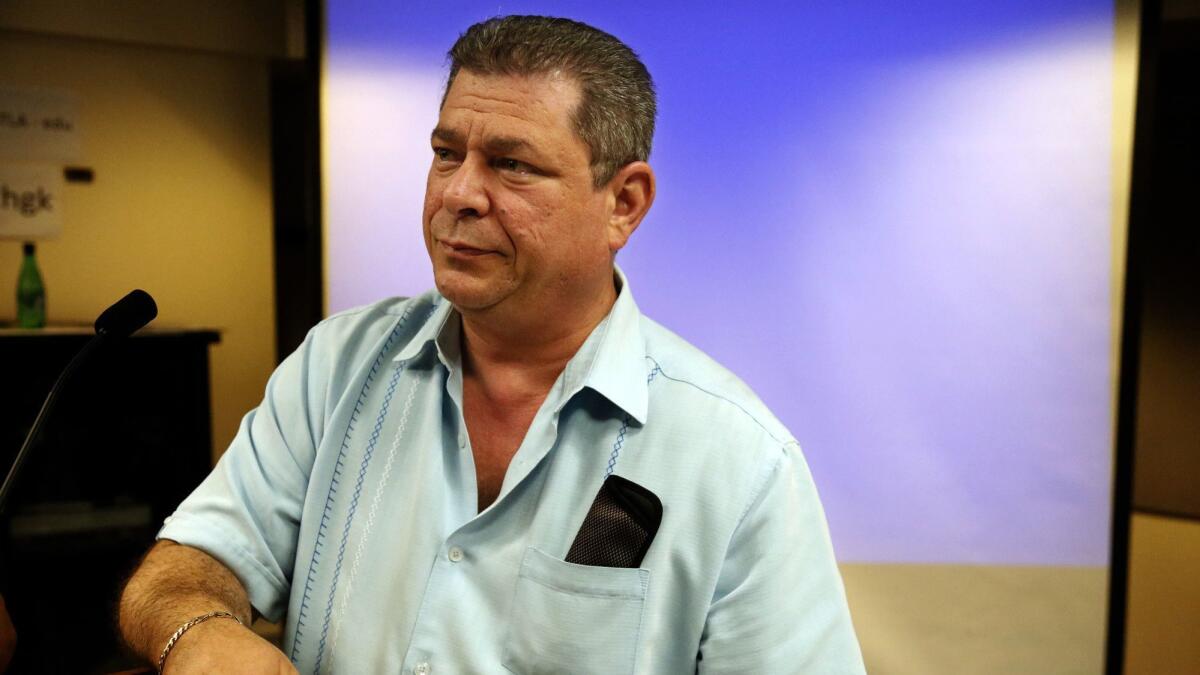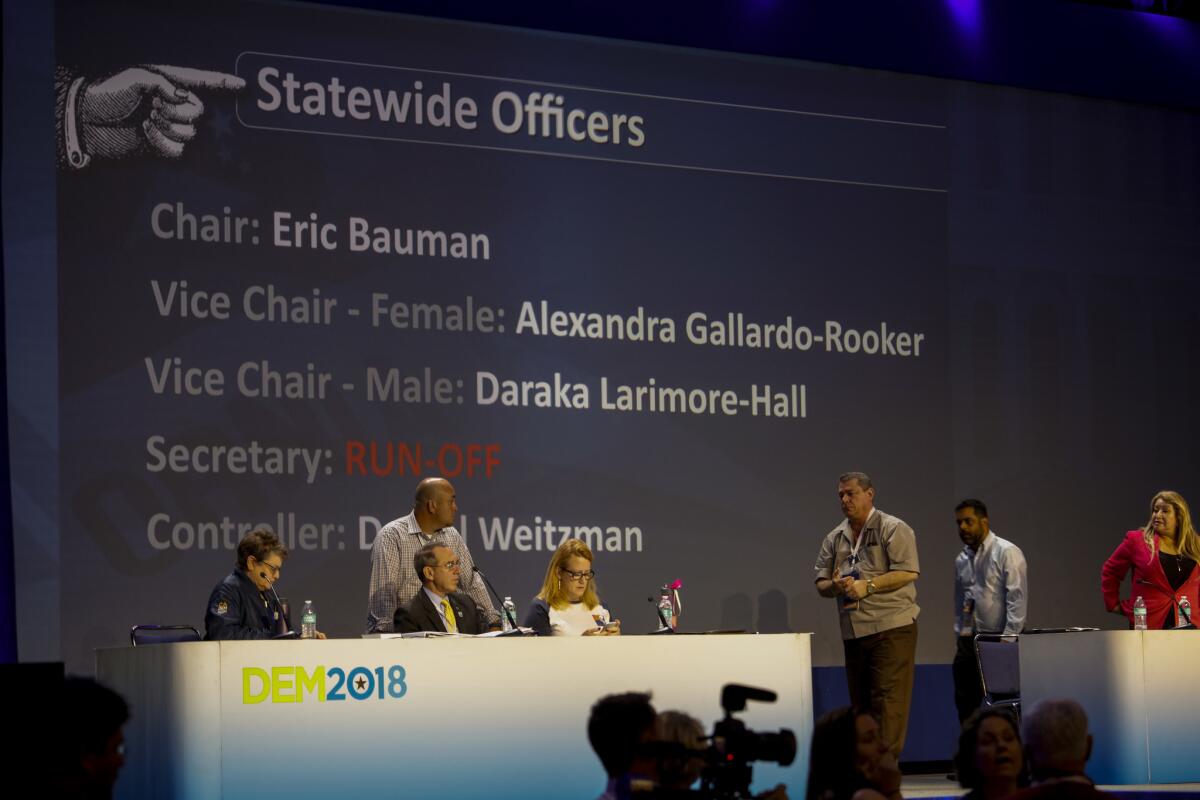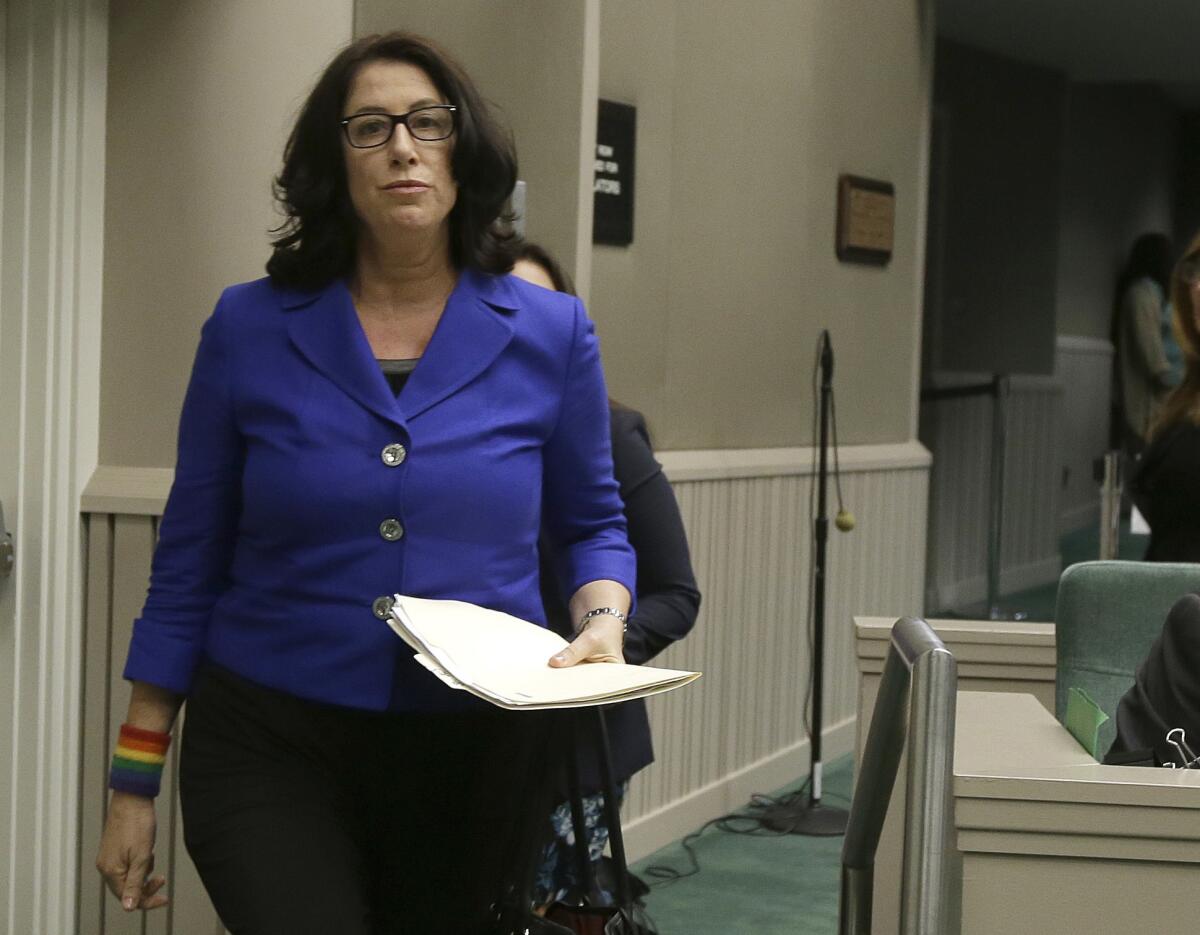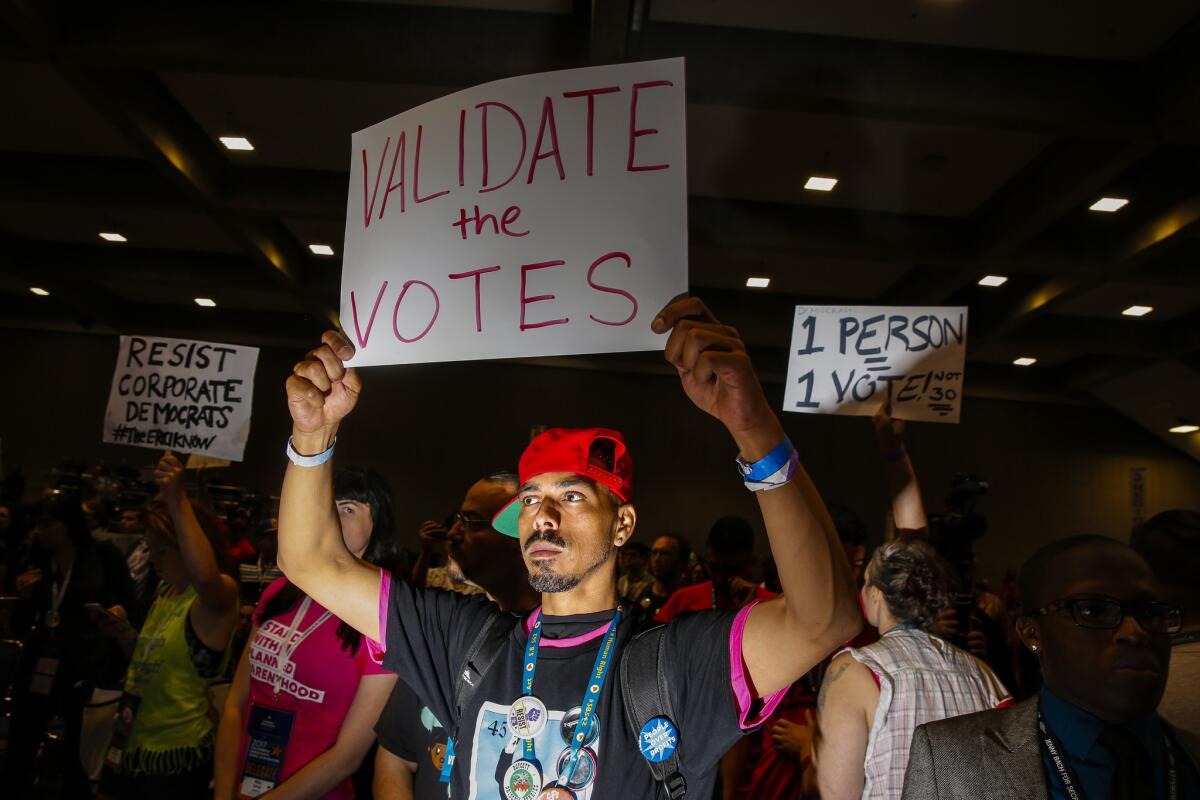Sexual harassment lawsuits against California Democratic Party prompt credibility crisis

- Share via
The California Democratic Party has staked its brand and platform on principles of diversity, equality and inclusion in the era of Trump and the #MeToo movement.
But now the party is grappling with a credibility crisis after it was hit with multiple lawsuits alleging sexual harassment and workplace retaliation by its former leader. And with a crucial election year approaching, some within the party worry that the legal troubles could hurt efforts to raise money and inspire volunteers.
While Democrats nationwide have focused on issues of sexual misconduct and workplace bias, the state party now faces allegations that its leaders failed to address problems within their own ranks.
The concerns have sparked a push for new reforms and to better understand what went wrong.
“It’s an existential decision that we are making that we are going to live our values, that we are going to insist that our new leadership have accountability,” said Christine Pelosi, daughter of House Speaker Nancy Pelosi and chair of the state party’s Women’s Caucus. “I wouldn’t even call it a choice, because I don’t think we have a choice.”
“I think a lot of activists have lost faith,” added Bill Wong, who directs political strategy for the Democratic caucus of the state Assembly. “There’s a lot of frustration out there. I think where everybody’s at is trying to figure out how to earn back the trust of our base and the staff and rebuild the party.”
Democrats had barely finished their victory lap after historic midterm wins when state party Chairman Eric Bauman resigned in November following multiple allegations of misconduct. Three lawsuits have since been filed by current and former employees and an activist that claim the party turned a blind eye to allegations against Bauman, including that he discriminated against a high-ranking black female employee and sexually harassed or assaulted others.
An attorney for Bauman said he denies the claims in the lawsuits and “will not be trying his case in the media,” and the state party declined to comment on pending litigation. But Pelosi and others say it threatens to undermine the organization’s progressive mission.
In the first of the lawsuits, filed in January, three current and former employees alleged that Bauman’s misconduct was “well-known and apparently tolerated” by top party officials. The second suit claims the party “looked the other way” due to Bauman’s success in winning campaigns. And the third alleges the party fired two employees in retaliation for helping a colleague file a harassment complaint against Bauman.
The recent events have prompted a discussion within the party about what some call its toxic culture as the organization gears up to welcome more than a dozen presidential candidates and elect a new chair at its convention in San Francisco at the end of the month.
Some senior officers in the party have been criticized by rank-and-file members who say they didn’t do enough to prevent misconduct.
Alexandra “Alex” Gallardo Rooker, who stepped in as interim chair after Bauman resigned, was accused in one suit of putting “her own political agenda” ahead of “the safety and well-being of CDP employees.” Rooker declined to comment through a party spokesman.
One woman who filed a harassment claim against Bauman alleged in a lawsuit that Daraka Larimore-Hall, the party’s other vice chair, was not “willing or able to support” her when she complained. She later dropped her claims, she said, in order to speak out against Larimore-Hall’s alleged retaliation against her for being mentioned in the suit. One of several candidates running to fill the rest of Bauman’s term, Larimore-Hall has said his recollections of their interactions differ from what the woman alleged.

“There are a number of really important questions about who knew about [Bauman’s alleged behavior] and what they knew and when they knew that have to be addressed in order to restore trust and faith,” said Michele Dauber, a professor of law at Stanford University and a delegate to the state party.
Dauber, who led the successful effort to recall a Bay Area judge who handed down what some considered a light sentence in the sexual assault case of former Stanford student Brock Turner, called the lawsuits a “significant crisis” that could be “potentially bankrupting.”
Pelosi will present a set of proposals at the convention, including mandatory bias and harassment training for all party delegates and consultants, appointing a staff ombudsman to track complaints and investigations, and guidelines for power-sharing based on the results of the election for chair.
“Everybody seems to be saying we’ll work it out in a court of law and we’ll wait until we have a new chair before we have any new set of expectations,” Pelosi said. “That was not satisfactory to me.”

Pelosi noted that the allegations against Bauman came after the former chair helped her pass a resolution geared toward fighting harassment in the party. The lawsuits’ claims also show there are few mechanisms to hold a chair accountable outside of removal, Pelosi said. Others say the party lacks a protocol for suspending a chair in such a crisis.
“The benefit of the old smoke-filled rooms was if they yanked you, you were gone,” Pelosi said. “Right now, other than the goodwill of the chair, we don’t have an enforcement mechanism.”
The front-runners in the race to succeed Bauman have made reforming the party’s culture a central theme of their campaigns. At a recent forum in West Hollywood, Bay Area activist Kimberly Ellis pointed to mentions of Rooker and Larimore-Hall in pending litigation against the party.
“The truth of the matter is, when we use revenge and threats and bullying and abuse as political tools, then we get the toxic culture and environment that we find ourselves in today,” said Ellis, who lost narrowly to Bauman in 2017. She said she would hire a “head of people and culture” and institute a code of conduct for delegates.

Another leading candidate, Los Angeles County Federation of Labor President Rusty Hicks, said the party’s brand “has been tarnished.” He said he was soliciting policy recommendations to address party culture and promised to implement them within 30 days of taking office.
Larimore-Hall said Rooker’s response to the lawsuits highlights the need for more transparency in the party.
“The chair has all of the power and responsibility and knowledge and only shares it if they want to,” he said in an interview. “People look to this party to be on the right side of history, to lead with accountability, transparency, safety and equality, so we’ve got to get this right.”
But some top Democrats say the fallout is unlikely to produce lasting effects or impinge on the dominance of California Democrats, who hold all but seven of the state’s 53 U.S. House seats and more than two-thirds of seats in the state Legislature.
The party raised more than $62 million for the 2018 election and had $13 million in the bank as of its latest financial reports, dwarfing the $36 million raised last year by the state GOP, which has just a half a million banked as of April 20.
“What it means is they have to elect a new chair and that’s a pain in the butt,” said former legislator and U.S. Rep. John Burton, who preceded Bauman as party chairman and spent eight years in the role. “It isn’t going to cause any irreparable harm to the party. And when the lawsuits are settled and there’s a new chair, things will move on.”
Bob Mulholland, a veteran Democratic operative and longtime strategist for the state party, agrees.
“The Democratic Party is very strong in California, and it will remain so. This is an issue that has to be dealt with, but in the reality of the voters will have zero impact,” Mulholland said. While it may be tempting for political opponents to accuse the party of hypocrisy, he added, “it’s Trump’s Republican Party, not Mother Teresa’s.”
Donors to the Democratic Party say they are watching what happens next closely.
“Anyone who has been an institutional donor to the party over the past decade-plus is looking at this with a whole lot of caution,” said a source who represents a major donor organization to the Democratic Party and requested anonymity to speak freely. “We are all a little bit on pins and needles about what’s going to happen as a result of the lawsuits.”
Perhaps more important than the lawsuits in keeping the confidence of major donors, the source said, is the outcome of the chair’s race.
When disagreements have arisen with party leaders, labor organizations and other big donors have given money to political action committees and independent expenditure committees instead. In the early days of Burton’s tenure, for example, a dispute with the Service Employees International Union California led the organization to threaten to pull its funding.
Shawnda Westly, who served as executive director of the party under Burton, said if donations dry up, it could make Democrats less competitive as they seek to defend hard-fought wins and rack up additional victories.
“The party is not hurting for engaged, motivated activists, but energy alone doesn’t pay the bills,” Westly said. “If these lawsuits find the CDP is financially responsible, settlements could drain the [party’s] PAC, which is money Democrats need for voter turnout.”
The new chair, Westly added, must have the “immediate trust” of donors or “the opportunity for historic gains could be lost.”
While Democrats keep an eye on the impact the party’s troubles may have on its finances, some top members are working to keep the focus on preventing future misconduct.
At a recent gathering in L.A. County, candidates running for chair were asked to sign a pledge stating they would not retaliate against their rivals’ supporters. Hicks later issued a pledge of his own and promised not to disparage other candidates, retaliate against their supporters or condone such behavior by his own backers.
Pelosi says she has asked Ellis, Hicks and Larimore-Hall to endorse her proposed reforms, which call for a “victim-centered” investigation process into harassment claims. She says all three committed to supporting them.
Dauber said she has faith that whoever becomes the next chair can help the party move forward.
“It’s really important to not forget that these are real people here who have been significantly damaged by us, by the California Democratic Party,” Dauber said. “And it’s our job to help them decrease their trauma, not increase it.”
For more on California politics, follow @cmaiduc.
More to Read
Get the L.A. Times Politics newsletter
Deeply reported insights into legislation, politics and policy from Sacramento, Washington and beyond. In your inbox three times per week.
You may occasionally receive promotional content from the Los Angeles Times.











